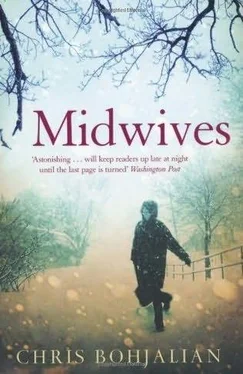Chris Bohjalian - Midwives
Здесь есть возможность читать онлайн «Chris Bohjalian - Midwives» весь текст электронной книги совершенно бесплатно (целиком полную версию без сокращений). В некоторых случаях можно слушать аудио, скачать через торрент в формате fb2 и присутствует краткое содержание. Жанр: Современная проза, на английском языке. Описание произведения, (предисловие) а так же отзывы посетителей доступны на портале библиотеки ЛибКат.
- Название:Midwives
- Автор:
- Жанр:
- Год:неизвестен
- ISBN:нет данных
- Рейтинг книги:5 / 5. Голосов: 1
-
Избранное:Добавить в избранное
- Отзывы:
-
Ваша оценка:
- 100
- 1
- 2
- 3
- 4
- 5
Midwives: краткое содержание, описание и аннотация
Предлагаем к чтению аннотацию, описание, краткое содержание или предисловие (зависит от того, что написал сам автор книги «Midwives»). Если вы не нашли необходимую информацию о книге — напишите в комментариях, мы постараемся отыскать её.
Midwives — читать онлайн бесплатно полную книгу (весь текст) целиком
Ниже представлен текст книги, разбитый по страницам. Система сохранения места последней прочитанной страницы, позволяет с удобством читать онлайн бесплатно книгу «Midwives», без необходимости каждый раз заново искать на чём Вы остановились. Поставьте закладку, и сможете в любой момент перейти на страницу, на которой закончили чтение.
Интервал:
Закладка:
Before Stephen or Patty could even begin to explain to us what they were doing or escort Tom and me back into the hallway, words and phrases and the names of people I knew popped out at me from the walls. I recognized that one sheet was filled with the names of midwives, and another with families whose children my mother had delivered. There was a sheet filled with names of doctors, and then one beside it with only one: my mother's backup physician, Brian "B.P." Hewitt. There was a page titled "Pathologists," and another with the strange and ominous-sounding word "vagal." And while it crossed my mind that the word might be some sort of abbreviation or modest abridgment for vaginal, something about the words underneath it-bradycardic, blackout, CPR, C-section-led me to conclude it wasn't.
"Connie, do keep all of this to yourself, won't you?" Stephen said suddenly, when he realized I was staring and reading.
"Oh, sure."
And as quickly and as casually as Tom and I had mistakenly wandered into the room, he ushered us out, telling us, "We kept the kitchen downstairs. It's nice to work in a place with a kitchen. Know what I mean?"
After my mother had completed the cesarean, she took the time to sew up Charlotte Bedford's body. This has always impressed me. Yet in my mother's notebooks, especially in those long entries she wrote in the weeks after Charlotte's death when she was trying to understand what had happened, there is only one sentence about that particular moment in the tragedy:
"Her body was too big to wrap in a blanket, so I sewed it up the best I could."
Read in a vacuum, independent of the rest of the notebooks, the sentence seems somewhat peculiar: neither illogical nor insane, but slightly odd. As if my mother has made some connection understood only by her. As if a link or a clause between blankets and sutures is missing.
The link appears in a notebook entry written almost three years earlier, an entry about different parents and a different birth:
Their baby was born dead, and the poor, poor thing was the most deformed creature I've ever seen. His intestines were on the outside. But of course his parents wanted to see him. And so I swaddled him in this little baby blanket one of his aunts had made, wrapping the little guy from his feet up to his nose because-if everything else wasn't bad enough-he was also missing the lower half of his jaw. I didn't cry when I was delivering him, because I'd known for a few hours he would be born dead, but I did when I had him wrapped and was showing him to his mom and dad. He looked so peaceful and so happy. Suddenly I was weeping.
At some point after my mother had delivered Veil, she returned to Charlotte's body. It wasn't right away, because first she had to tend to the baby, initially a pale, limp thing that seemed likely to die. She had to, as some midwives say, "work that baby hard." Vigorously rubbing the newborn's back, suctioning mucus, hitting the bottoms of his feet. Suctioning more mucus. Talking to him, asking his father to talk to him.
I imagine my mother telling Asa, "Say something. He needs to hear your voice! Talk to him!" Neither Asa nor Anne ever mentioned such an exchange during the depositions or the trial, however, and my mother never told me of one.
Nevertheless, it is clear that in those first minutes after Veil arrived, my mother was focused solely on getting the child to breathe. Obviously she succeeded.
And when it was clear that the child would live, she handed Veil to his father and started ministering to him. She held Asa, first standing and then sitting. The two adults-with the boy in his father's arms-slid down the wall beside the window until they were on the floor, the small of their backs against the baseboard trim. My mother's arms never lost their hold on the pastor.
Anne said she heard my mother tell Asa over and over that the baby was beautiful, and might have said a couple of times, "It's all right. Shhhh. It's all right."
Asa was crying, his shoulders rising and falling as he gasped for air in the midst of his sobs.
And at some point on the bed, Charlotte's body stopped bleeding. When the autopsy was conducted, the medical examiner would find just about seven hundred and fifty milliliters of blood in the peritoneal cavity. Imagine more than two pints of milk. And then there were the unmeasurable waves of blood that had rolled from the incision-and overflowed from inside the abdomen-onto the bed, soaking the sheets and mattress and the pillow my mother had used like a sponge, until the white bedding looked burgundy.
When my mother finally stood and returned to that bed and the body upon it, no one looked at his or her watch or noticed the time on the clock on the nightstand. But given Asa and Anne and my mother's agreement that it had been ten minutes after six when something happened-when Charlotte's chin shot up as she pushed, and Asa watched his wife's eyes roll up into her head-everyone agreed it was probably between twenty to seven and quarter to seven when my mother stood for a long moment with her hands rubbing the back of her neck, and stared down at Charlotte's brutalized body.
If I have interpreted the remark in my mother's notebook correctly, the idea passed through her mind to simply wrap the body in a blanket. Perhaps she would have folded the skin back over the wound first. Perhaps not. But she wanted to cover the body; she didn't want it left exposed and cold and so very open.
But in my mother's mind the body was too big to be swaddled, and so she repaired it. There were still towels folded on a chair in a corner of the room, and my mother took one and patted the area around the incision dry. Sterility no longer mattered. She then put the towel on a corner of the mattress at the foot of the bed and went to her birthing bag for her catgut. Her tweezers. Her curved needle and needle holders.
And she began to work. Sealing the wound took three packages of dissolvable sutures.
When the medical examiner testified, he noted that my mother had not concerned herself with repairing the damage to the uterus; she had not stitched the spot where she had torn open the womb. He didn't present this information as an indication that my mother's work was shoddy, or to convey the idea that she was disrespectful of the dead. On the contrary, he said my mother's sutures were "professional and tight. Her work was perfectly capable."
His point-the State's point-was simply that my mother was not attempting to save Charlotte's life when she sewed the body back together; she understood that Charlotte was dead. By that point, my mother was simply concerned with the cosmetics.
When my mother was giving her own testimony, Stephen asked her why she had bothered to sew up a body she knew was dead.
"I couldn't leave her like that," my mother said. "It wouldn't have been fair to her, and it wouldn't have been fair to her family."
"Her family?" Stephen asked, expecting her to clarify that she had meant Charlotte's husband, or, perhaps, Charlotte's husband and her family in the South.
"Asa and Veil," my mother said, beginning one of the many exchanges between the two in which Stephen thought he knew exactly what my mother was going to say, while my mother assumed that whatever she was going to say was completely harmless. Sometimes she was right, sometimes she wasn't.
"But mostly Veil. How we come into this world means more than any of us understand," my mother continued. "So I wanted to be sure that Veil saw his mother: I wanted to be sure he had a picture with him for life of how incredibly sweet and pretty and peaceful-just amazingly peaceful-her face was. Even then. Even after all she'd been through. Even at the very, very end."
Part Three
Chapter 14.
Stephen and Rand want me "pumped up." "Fired up." "Psyched." They want me ready for a fight.
Читать дальшеИнтервал:
Закладка:
Похожие книги на «Midwives»
Представляем Вашему вниманию похожие книги на «Midwives» списком для выбора. Мы отобрали схожую по названию и смыслу литературу в надежде предоставить читателям больше вариантов отыскать новые, интересные, ещё непрочитанные произведения.
Обсуждение, отзывы о книге «Midwives» и просто собственные мнения читателей. Оставьте ваши комментарии, напишите, что Вы думаете о произведении, его смысле или главных героях. Укажите что конкретно понравилось, а что нет, и почему Вы так считаете.











